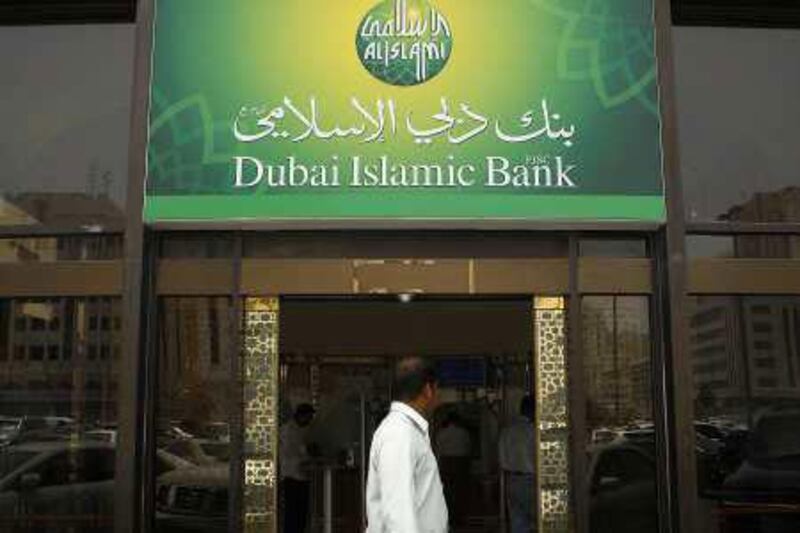Abu Dhabi // Dubai Islamic Bank unveiled a 40 per cent decline in second-quarter net profit Saturday, joining a growing list of banks reporting weaker earnings as more loans go sour amid sliding property prices and the global economic crisis but beating analysts' forecasts.
Dubai Islamic Bank (DIB), the nation's sixth-largest bank by assets, said net profits in the second quarter totalled Dh450 million (US$122.7m), a 40 per cent drop from the second quarter of 2008. Profits for the first half were Dh820m, 37 per cent lower than in the same period last year, according to the bank's previous disclosures. It did not publish a financial statement for the first half to accompany its release.
DIB's chairman, Mohammed al Shaibani, said in a statement: "The past few months have been challenging for the banking and finance industry in the region and globally. As we begin to see gradual stabilisation of the markets in the past quarter, DIB is optimistic of the recovery of regional markets." Mr al Shaibani is also director general of the Ruler's Court of Dubai and sits on the board of Dubai's Supreme Fiscal Committee.
Most banks are still seeing growth in their overall business compared with last year. But with half of the country's top 10 banks having reported first-half results, only one, the Abu Dhabi-based First Gulf Bank has managed to squeeze out higher profits. Others have seen profits fall from 11 per cent, in the case of the Commercial Bank of Dubai, to 44 per cent, at the Abu Dhabi Commercial Bank (ADCB). The nation's two largest banks, Emirates NBD in Dubai and the National Bank of Abu Dhabi, have yet to report first-half results.
Results for the second quarter have been even more downbeat, with declines ranging 4 per cent at First Gulf Bank to a 51 per cent drop at ADCB. The decline in earnings comes as banks set aside an increasing amount of their earnings to compensate for loan defaults. DIB said it had set aside an additional Dh135m in the second quarter against bad loans, bringing its total provisions to Dh239m. ADCB nearly tripled its bad-loan provisions, to Dh890m. Without such provisioning, ADCB's first-half profits would have risen 5 per cent, the bank said.
Data released earlier this month by the Central Bank showed banks had set aside a total of Dh23.9 billion against non-performing loans, or NPLs, a 21 per cent rise since the end of the year. Provisioning against NPLs has climbed 30 per cent since August last year Analysts and economists said the growth in provisions was a positive step by the banks to protect themselves from growing defaults. "If you didn't see provisions rising, it would be troubling," said Simon Williams, the chief economist at HSBC in Dubai. "That's what happens when the credit cycle turns."
Earlier this month, the credit ratings agency Standard & Poor's cut its rating for Emirates NBD, DIB and Mashreqbank, the nation's fifth-largest, blaming their exposure to the weakening property market. Residential property prices in Dubai fell by at least a third in the first quarter from their peak last September. "The risks to Dubai's economy have, in our view, increased," S&P said at the time. "The economic slowdown, stock market decline and dropping real estate prices are raising significant hurdles for these Dubai-based banks. We expect these factors to significantly slow business growth and lead to a deterioration in asset quality and profitability."
The central bank figures indicate that only a tiny fraction - about 2 per cent - of all loans have been classified as non-performing. Analysts worry that banks may be under-reporting the number of loans whose borrowers have stopped paying as they negotiate with them to restructure or reschedule. Mardig Haladjian, who heads GCC bank coverage at the ratings agency Moody's Investors Service, told The National earlier this month: "Almost every single bank we talk to in the UAE is seeing an increased occurrence of renegotiating and restructuring loans, often with family-owned businesses."
Of particular concern are banks' exposure to two family-run Saudi conglomerates, Saad and Al Gosaibi, which have defaulted on their debts. Last week Standard & Poor's said that banks from Saudi Arabia and the UAE accounted for roughly two thirds of the loans to the two troubled companies, but the potential for losses remained manageable as the banks were cushioned by collateral, loan-loss provisions and adequate levels of capital.
First Gulf Bank and ADCB, which is believed to have roughly $500m in loans to Saad and Al Gosaibi, have said their provisions take into account their exposure to the two groups. Union National Bank has reported having exposure only to Al Gosaibi, while Commercial Bank of Dubai said it had no exposure to either. DIB made no mention of the Saudi groups in its statement yesterday. Despite concerns about the banks' health, analysts say measures of their ability to withstand such shocks remain strong. The Central Bank has said that the average capital adequacy ratios are at 16.2 per cent, well above its requirement of 11 per cent.
Lending by banks continues to grow, moreover, even though several banks remain in violation of Central Bank regulations against having loans in excess of deposits and available cash. Banks have been struggling to boost deposits through higher interest rates amid the crisis in order to free more cash for lending. Property industry executives say restrictions on mortgage lending have eased somewhat, but credit remains tight for companies.
Tight credit and falling land values have forced Dubai to come to the rescue of its own government-linked property developers, borrowing $10bn from the Central Bank. Last week, Dubai said it would borrow another $10bn and set up a new financial support fund to direct the cash to those having trouble raising money from private bankers and investors. @Email:warnold@thenational.ae





